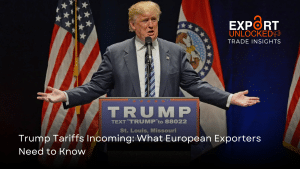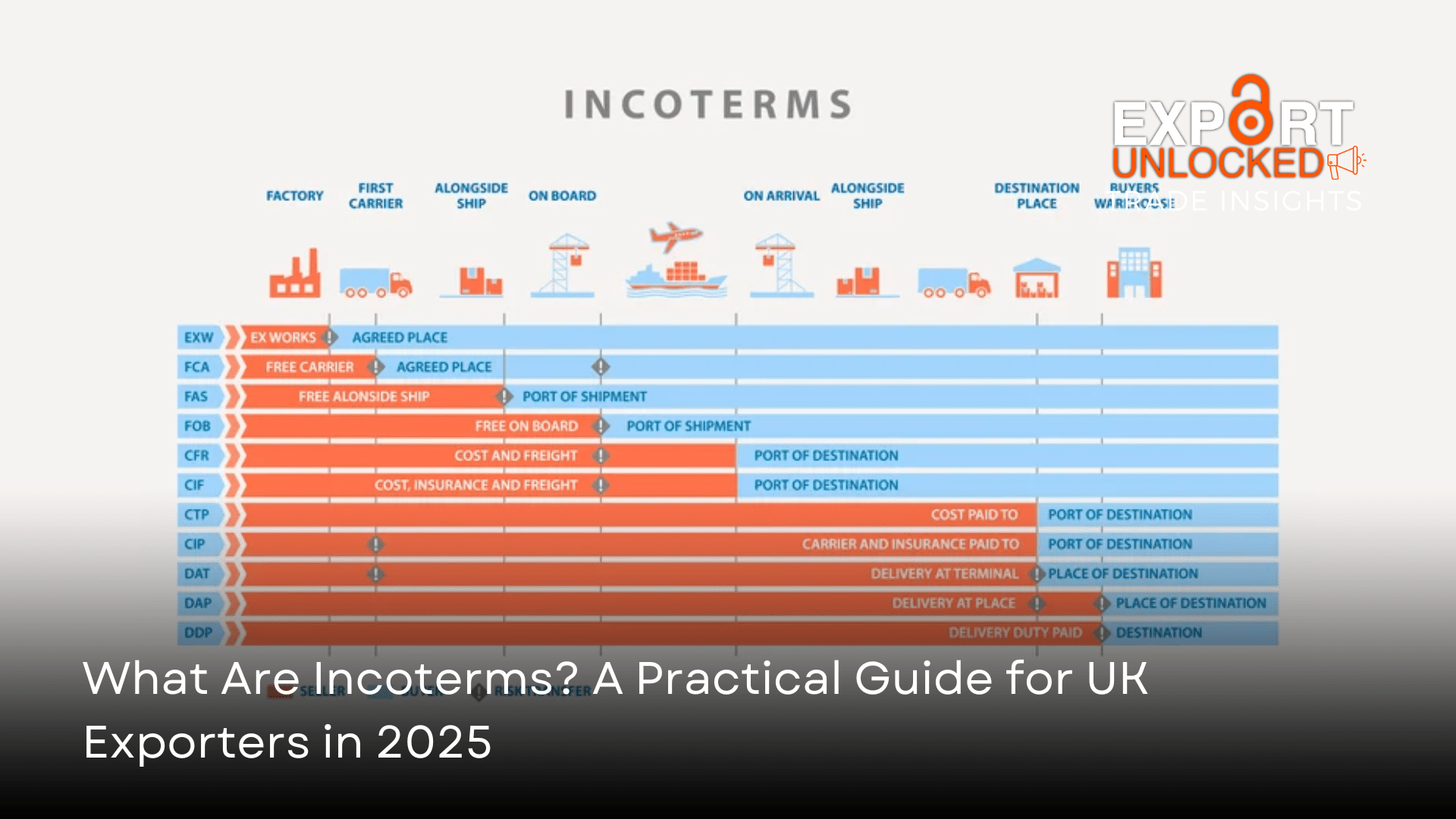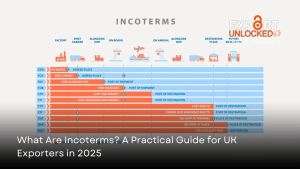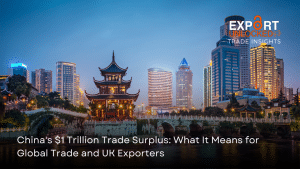

Home » What Are Incoterms? A Practical Guide for UK Exporters in 2025
What Are Incoterms? A Practical Guide for UK Exporters in 2025
By Export Unlocked, Megi Dervishi | 28 March 2025
As international trade becomes more complex, one thing remains essential for smooth global transactions: understanding Incoterms. For UK exporters, these standardised terms can distinguish between a successful shipment and an expensive mistake. Whether you’re just starting your export journey or expanding into new markets, this guide will walk you through what Incoterms are, why they matter in 2025, and how to use them to your advantage.
What Are Incoterms?
Incoterms, short for International Commercial Terms, are globally recognised trade terms developed by the International Chamber of Commerce (ICC). They define the responsibilities of buyers and sellers in international transactions, clarifying who is responsible for shipping, insurance, customs clearance, risk, and other aspects of the trade process.
These terms are vital for setting clear expectations between trading partners and ensuring everyone understands their role from origin to destination.
Why Incoterms Matter for UK Exporters
For UK businesses involved in importing or exporting goods, Incoterms provide a common language that removes ambiguity. They help prevent misunderstandings, avoid legal disputes, and ensure a smooth flow of goods across borders.
Understanding Incoterms also helps UK exporters:
– Avoid unexpected costs and liability
– Improve negotiation confidence
– Streamline logistics and documentation
– Remain compliant with global standards
Whether you’re trading with the EU, the US, Asia, or beyond, knowing your Incoterms is essential.
The Most Common Incoterms Explained
There are 11 Incoterms in total, but here are some of the most frequently used by UK exporters:
- EXW (Ex Works): The buyer takes full responsibility for transportation from the seller’s premises onward. It’s simple for the seller but risky for buyers unfamiliar with the export process.
- FOB (Free On Board): The seller is responsible for delivering goods to the port and loading them on the vessel. Risk transfers to the buyer once the goods are on board.
- CIF (Cost, Insurance & Freight): The seller covers the cost, insurance, and freight to the destination port. Risk still passes to the buyer once goods are loaded, but the seller pays the costs.
- DAP (Delivered at Place): The seller handles nearly everything, delivering the goods to the buyer’s location, excluding import duties and taxes.
- DDP (Delivered Duty Paid): The seller takes on maximum responsibility—handling all costs, duties, and logistics until the goods reach the buyer. It’s convenient for the buyer but costly for the seller.
What Changed in Incoterms 2020?
The latest update to Incoterms was released in 2020, and it continues to guide trade in 2025.
Key updates included:
- DAT (Delivered at Terminal) was replaced by DPU (Delivered at Place Unloaded) to better reflect the reality of modern logistics.
- Clarifications around transport security, insurance obligations, and cost breakdowns.
It’s crucial for businesses to use the correct version of Incoterms in contracts; using outdated terms can lead to legal and logistical issues.
Common Mistakes UK Exporters Make with Incoterms
Even experienced exporters can fall into common traps, such as:
- Using the wrong term for the mode of transport (e.g., using FOB for air freight). – Misunderstanding risk transfer, leading to disputes or financial loss.
- Failing to update to Incoterms 2020, may cause compliance issues or outdated contract terms.
How to Choose the Right Incoterms
Selecting the right Incoterm depends on your product, destination, buyer relationship, and logistics capabilities. Key questions to ask include:
- Who should be responsible for transport and insurance? – How experienced is the buyer in handling imports?
Do you want to control more of the shipping process or reduce your risk?
This decision should be part of your broader export strategy, and training can help you build confidence in choosing the right term every time.
How Export Unlocked Can Help
At Export Unlocked, we offer practical, hands-on Incoterms training tailored for UK businesses of all sizes. Our workshops and accredited courses help you:
- Understand each Incoterm in depth
- Avoid common compliance mistakes
- Confidently manage your international contracts
We’ve trained businesses across the UK and internationally, including with Chambers of Commerce, the ICC Academy, and more. Whether you’re shipping your first product or scaling up your exports, our team is here to guide you.
Conclusion
Incoterms are more than just contract language—they’re a critical tool for protecting your business and ensuring smooth, compliant global trade. As markets evolve and trade rules shift, investing time in understanding Incoterms is a smart move for any UK exporter.
Ready to upskill and take control of your export journey? Explore our Incoterms training and international trade workshops today.
Want to Become an Expert in Incoterms 2020?
We offer multiple courses specifically focused on Incoterms 2020, designed to help your business avoid costly mistakes, improve compliance, and reduce unnecessary costs. Whether you’re just starting or need advanced guidance, our training will give you the confidence and clarity to trade smarter.
Our next workshop for Incoterms 2020 is on the 15th of April 2025 – Reserve your spot here!
Empowering Your Global Trade Success
Discover More Articles:



